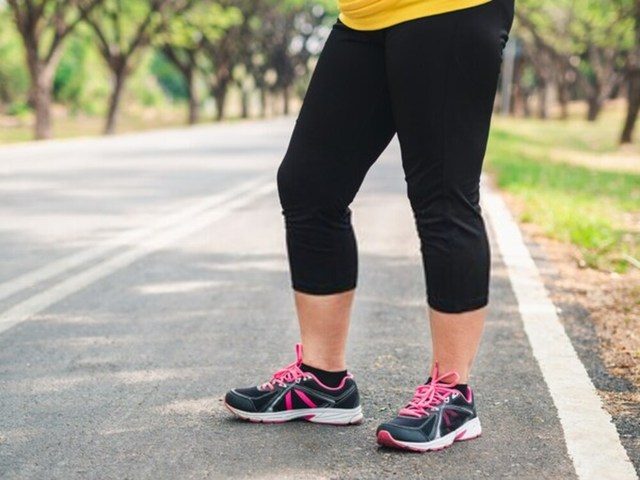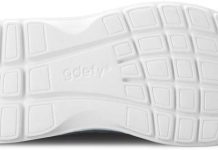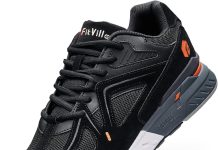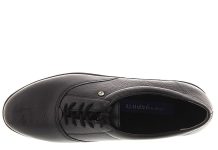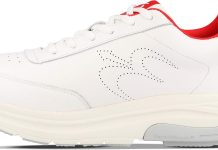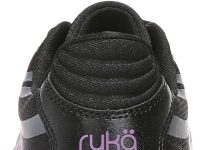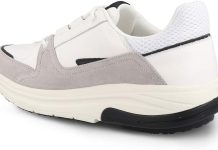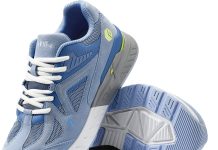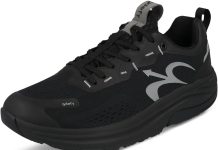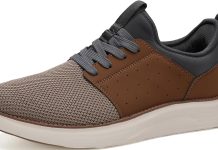With all gyms closed during COIVD, and honestly, the only thing to permit is to go on walks to enjoy nature and get some new air and exercise to keep our sanity from this lockdown, walking is on the rise.
Starting a walking program is the best step to bettering your health. Anyway, remember to do it wisely.
If you’re like most people, you probably don’t think much about your shoes. You put them on, tighten them, and go about your day.
But what you wear on your feet dramatically impacts your health and well-being. That’s why choosing the right pair of shoes for your body type and activity is essential.
If you’re overweight, finding exercise shoes that are comfortable and supportive can be challenging.
Here are some tips for finding the best exercise shoes for overweight people:
Top Three Running Shoes for Plus-Size Runners
You must find the best shoes for your body type to reject any further issues or injuries.
ASICS Gel-Venture 6 Running Shoe
Heavy walkers know all those foot issues like overpronation, fascitis, supination, and knee pain, which arise from being overweight and putting more force on feet.
Their sixth edition of the Gel-Venture model is the shoe that fully proves it.
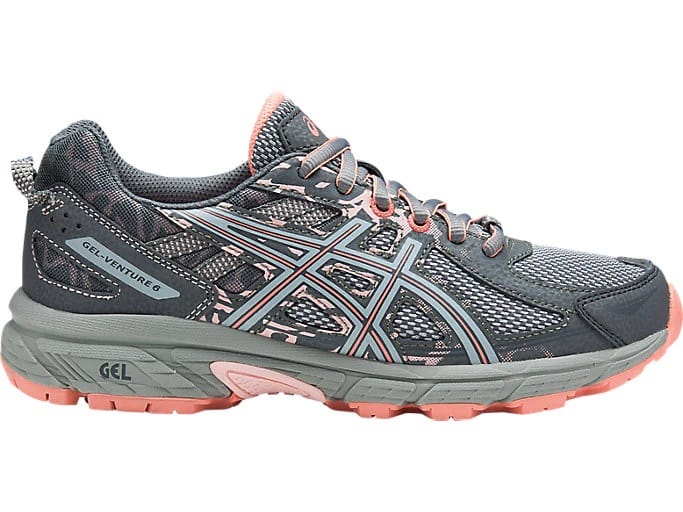
Although these sneakers were initially meant for running, heavy guys feel way more relaxed wearing the Gel-Venture 6 than most walking shoes accessible on the market.
Read Next – Best Walking Shoes for Overweight Walkers
Brooks Addiction Walker Walking Shoes
Brooks has a firm’s fame that forever knows what this or that foot needs, and this revolutionized Brooks addiction walker is another proof of that.
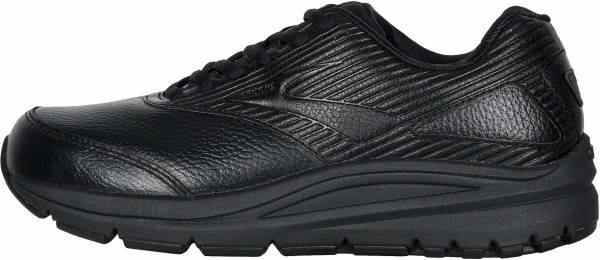
Unlike the new 840 Balance, which copes with low-intensity workouts, this Brooks has the fit and feel of a running shoe but is mainly designed for walking.
This sneaker stops the feet from turning outward and inward, eventually reducing the risk of injury or pain in the knees, legs, and feet.
Read NEXT – Best Walking Shoes With Arch Support
New Balance MW411v2 Walking Shoe
These walking shoes are the best choice for heavy guys who like classics.
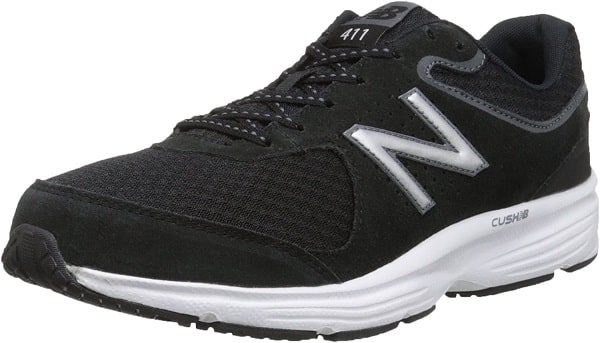
Their simple, sleek external design, represented in six basic color choices, probably would not be appreciated by style hunters. However, it will become a favorite for overweight people who do not want to show off a lot.
Read Next – New Balance Men’s MW411v2 Walking Shoe
Best Running Shoes For Heavy Runners Review of 2023
Read Next – Best Walking Shoes With Arch Support
What are the best exercise shoes for overweight people?
If you are overweight, finding shoes to help you stay active and fit is essential. Several types of exercise shoes can help people with obesity get the most out of their workouts.
Some of the best exercise shoes for overweight people are those with a low profile or cork footbed.
These shoes provide good support and cushioning, which can help reduce fatigue and soreness in the feet. They are also ideal for people with trouble finding shoes that fit well.
Another type of shoe that is often recommended for overweight individuals is the cross-fit shoe. These shoes have a snug fit and are made from a durable fabric.
They are also designed to support your feet and ankles during strenuous exercises.
The Nike Free Run+ may be a good option if you are looking for an all-purpose shoe. These sneakers have a lightweight construction and a rubber sole that provides good traction when running or walking.
They are also breathable, so your feet stay cooler during intense workouts.
New Balance Women's 577 V1 Lace-Up Walking Shoe, White/White, 8 M US
$70.97 in stock
Brooks Addiction Walker 2 White/White 9
$111.99 in stock
Types of exercise shoes for overweight people
Overweight people can wear many exercise shoes, each with benefits and drawbacks.
Running shoes:
One of the most common types of exercise shoes worn by overweight people is running shoes. Running shoes are designed to provide good cushioning and fit snugly to prevent excessive ankle movement and rubbing.
Running shoes are also often made with a thicker sole for extra stability on rougher surfaces. However, running shoes tend to be heavier and more expensive than other exercise shoes, which may make them less appealing for some overweight people.
Cycling:
Another type of shoe commonly worn by overweight people is cycling footwear. Cycling footwear typically features a thick sole that provides good cushioning and stability when cycling on rough surfaces or over bumpy terrain.
Cycling footwear can be less heavy and more affordable than running Shoes, but they may not provide as much support when cycling on smooth ground or toeing the pedal at high speed.
Hiking/backpacking boots:
Hiking/backpacking boots are another type of shoe that overweight people can use. Walking/backpacking boots feature a tough leather or synthetic material that protects the foot against debris and sharp stones while hiking or backpacking in rugged terrain.
Hiking/backpacking boots can also be fitted with inserts that provide additional support when walking long distances or hiking up steep hillsides.
Although hiking/backpacking boots may be more expensive than other exercise shoes, they can provide more protection and stability during strenuous activities.
Walking/running shoes:
Walking/running shoes are a type of shoe that is designed to provide proper support and stability when walking or running.
Walking/running shoes typically have a thick sole that provides cushioning and stability when walking or running on hard surfaces. Walking/running shoes are also often fitted with built-in arch support that helps to prevent foot fatigue and injuries.
However, walking/running shoes are typically more expensive than other exercise shoes and may be less durable.
Read Next – Best Shoes For Beginner Overweight Runners
What to look for in an exercise shoe for overweight people
If you are overweight, finding shoes that fit your feet is essential.
There are several features to look for when choosing exercise shoes for overweight people:
- Upper Material: Exercise shoes should have a sturdy, supportive upper material. This material should be breathable and moisture-wicking so that feet stay dry and comfortable during workouts. Some suitable materials include mesh or ballistic nylon.
- Insole: The insole should be soft, pliable, and contoured to the foot’s shape. It should also provide adequate arch support and cushioning.
- Heel Height: The heel height of the shoe should be low enough so that pressure is not put on the Achilles tendon but high enough so that the foot can move quickly and effectively. Heels that are too low can cause ankle sprains, while heels that are too high can lead to decreased balance and stability while exercising.
- Sole Material: The exclusive material should be strong yet flexible to provide good traction while walking or running. It should also be durable so that it lasts longer than regular sneakers. Some good options include rubber or hard plastic.
New Balance Women's 577 V1 Lace-Up Walking Shoe, White/White, 8 M US
$70.97 in stock
Brooks Addiction Walker 2 White/White 9
$111.99 in stock
Read Next – Best Walking Shoes for Exercise
Pros and Cons of using exercise shoes for overweight people
There are some pros and cons to using exercise shoes for fat people. One pro is that they can help you maintain balance and stability while exercising.
The extra weight can often cause your feet and knees to move unexpectedly, leading to injuries. Another pro is that exercise shoes can make it easier to engage your core muscles since they provide support.
However, exercising in shoes can be more challenging because they constrain your movement.
Additionally, overweight people may experience pain from wearing shoes that are too tight or too large and may not be able to wear them for long periods without experiencing discomfort.
Read Next – Best Walking Shoes for Heavy/Overweight Walkers
Conclusion
Exercise may not be your answer if you are overweight and looking for a way to lose weight. Exercise is essential, but it is only one component of a healthy lifestyle.
The best exercise shoes for overweight people have cushioning and support to help reduce stress on your feet and ankles.
Make sure to try out different brands and styles of shoes to find the perfect pair that fits your needs and helps you achieve your fitness goals.
New Balance Women's 577 V1 Lace-Up Walking Shoe, White/White, 8 M US
$70.97 in stock
Brooks Addiction Walker 2 White/White 9
$111.99 in stock
Brooks Men's Addiction Walker 2, Black, 12 D
Brooks Women's Addiction Walker V-Strap 2, Black, 8 D
ASICS Men's Gel-Venture 7 Running Shoes, 9.5M, Black/Sheet Rock
ASICS Men's Gel-Venture 6 Running Shoe, Graphite Grey/Black, 10 M US
Saucony Women's VERSAFOAM Cohesion 12 White/Navy/Teal Road Running Shoe 10 Medium US
Skechers Men's Max Cushioning Elite-Performance Walking & Running Shoe Sneaker, Black, 9 X-Wide
Skechers mens Go Run Consistent - Performance Running & Walking Shoe Sneaker, Black/Grey, 13 US
$48.23 in stock
ASICS Women's Gel-Venture 8 Running Shoes, 7.5, MAKO Blue/Pink GLO
Read Next – New Balance Men’s MW877 Walking Shoe
Q: What are the best exercise shoes for overweight runners?
A: The best exercise shoes for overweight runners provide extra stability, cushion, and support to the feet and ankles.
Q: What should I look for in running shoes for overweight runners?
A: Overweight runners should look for shoes with good shock absorption, midsole cushioning, arch support, and extra stability.
Q: Can overweight runners use regular running shoes?
A: Overweight runners need shoes that can handle their extra weight and provide the support and cushion they need. Regular running shoes may not be enough.
Q: What is the recommended weight limit for regular running shoes?
A: The recommended weight limit for regular running shoes is 180-200 pounds. Overweight runners may need shoes that can handle more weight.
Q: Should I get orthotic insoles for my running shoes?
A: If you have flat feet, plantar fasciitis, or need extra arch support, getting orthotic insoles for your running shoes is a good idea. However, if you don’t have any specific foot problems, you may not need them.
Q: What are the best brands of running shoes for heavier runners?
A: Some of the best brands of running shoes for heavier runners include Brooks, Saucony, Hoka One One, and Asics.
Q: Should overweight runners choose road running or trail running shoes?
A: It depends on where you’ll be running. Road running shoes are ideal if you’ll be running on paved roads or tracks. If you are running on uneven, off-road terrain, trail running shoes are better.
Q: Is it better to walk or run if I’m overweight?
A: Both walking and running can be beneficial for overweight individuals. However, running may put more stress on the joints. Choosing the right shoes and starting slowly with any new exercise routine is essential.
Q: How can I find the right running shoes for my body weight and running form?
A: The best way to find the right running shoes for your body weight and running form is to go to a specialty running store and have a professional fitting. They will analyze your gait and recommend shoes ideal for your body and running style.
Q: Can the right shoes help prevent injury for overweight runners?
A: Yes, the right shoes can help distribute the impact of running and make it more comfortable, which can help prevent injuries. It’s essential to choose shoes that are specifically designed for heavier runners.
Q: What are the best exercise shoes for overweight individuals?
A: The best exercise shoes for overweight individuals provide extra cushion and support to reduce the impact on the feet and joints. Look for shoes with good arch support and ample room in the toe box.
Q: What is the difference between running shoes and walking shoes?
A: Running shoes are designed for forward motion and tend to have more cushioning and support than walking shoes. Walking shoes are designed for a more natural foot motion with less impact but provide good cushion and support.
Q: What should I look for in a pair of running shoes if I am overweight?
A: If you are overweight, look for running shoes with extra stability and support to reduce the impact on your feet and joints. Shoes with wider soles and ample cushioning are also a good choice.
Q: What brand of shoes is best for overweight runners?
A: Brooks, Saucony, and Asics are famous running shoes designed to provide extra support and cushioning for overweight runners.
Q: What is overpronation, and how does it affect shoe choice?
A: Overpronation is when your foot rolls inward excessively when you walk or run. This can lead to injuries, so choosing shoes with adequate arch support and stability is essential to correct this issue.
Q: Can overweight individuals wear walking shoes for running?
A: While walking shoes may be comfortable for walking, they are not designed for the higher impact of running. Choosing running shoes that provide the necessary support and cushioning for your body weight and activity level is best.
Q: Do I need to buy expensive running shoes?
A: Expensive doesn’t always mean better. Finding a pair of running shoes that fit well and provide the necessary support and cushioning for your body weight and activity level is more important.
Q: How long do running shoes last?
A: Generally, running shoes should be replaced every 300-500 miles or every 6-8 months, whichever comes first. However, heavier runners may need to replace their shoes more frequently.
Q: What are the best walking shoes for overweight women?
A: Look for walking shoes with good arch support, ample cushioning, and a wide toe box to accommodate wider feet. New Balance, Brooks, and Asics are popular brands of walking shoes for overweight women.
Q: What are the best running shoes for overpronation?
A: Shoes that have arch support and extra cushioning are best for overpronation. Brooks Adrenaline GTS and Asics Gel-Kayano are great options for runners who overpronate.
Q: What are the best running shoes for overweight people?
A: The best running shoes for overweight individuals offer plenty of cushion and support. Some famous brands that offer great options are Brooks, Saucony, and Asics.
Q: Why is finding the best running shoes essential for overweight walkers?
A: Walking and running can put a lot of stress on the feet, ankles, and knees. Finding the proper running or walking shoes can make your exercise routine more comfortable and help reduce the risk of injury.
Q: How can I tell if a running shoe has good arch support?
A: Look for shoes that advertise arch support or have a visible arch in the sole. Additionally, many running shoe brands offer models with different levels of support, so it’s a good idea to ask for help if you’re unsure which shoe to choose.
Q: Do overweight men need a different type of running shoe?
A: It’s not necessarily about gender but more about individual needs based on weight and gait. Heavier runners may benefit from a stability shoe or a shoe with extra cushion, while those with flat feet or high arches might need shoes with specific support features.
Q: What are the best road running shoes for overweight individuals?
A: The best road running shoes for overweight people offer extra stability and support. Some popular options include the Brooks Adrenaline GTS, the Saucony Guide, and the Asics Gel-Kayano.
Q: What is the difference between running shoes and walking shoes?
A: Running shoes tend to have more cushioning and flexibility in the forefoot, allowing for a natural foot strike while running. Walking shoes often have a stiffer sole and less cushioning, as the heel absorbs most of the impact rather than the foot ball.
Q: How do I know if I need a supportive running shoe?
A: If you experience pain in your feet, ankles, knees, or hips during or after running, a supportive running shoe may be the solution. Look for shoes with extra cushion, arch support, or stability features to help alleviate pain and prevent injury.
Q: When is it time to get new running shoes?
A: Generally, runners should replace their shoes every 300-500 miles. However, it’s also essential to pay attention to the wear patterns on your shoes and to replace them if they start to feel loose or uncomfortable or if you notice uneven wear on the soles or upper.
Q: Can a running shoe ideal for heavy runners also work for those running or walking for weight loss?
A: Absolutely – the same features that make a great running shoe for overweight individuals (cushioning, support, stability) can benefit anyone looking to lose weight through exercise.
Q: What should I look for in a great running shoe for heavier runners?
A: A great running shoe for heavier runners will offer plenty of support, stability, and cushioning. Look for shoes with a broader base and plenty of room in the toe box to accommodate larger feet, and consider shoes with features like motion control or extra arch support if you need them.

